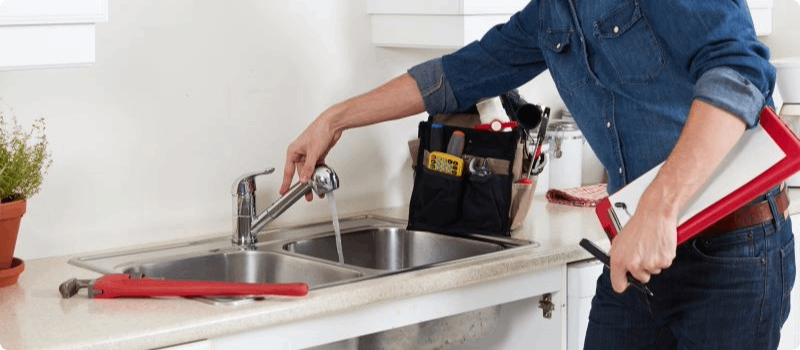Does insurance cover water leaks?
Updated February 3, 2020 . AmFam Team
Updated February 3, 2020 . AmFam Team
A standard homeowners insurance policy typically covers some costs associated with water leaks. Coverage is limited to sudden accidental events, such as an abrupt plumbing-related water leak.
Other types of water leaks, such as those resulting from wear and tear over time, aren't usually covered by standard home insurance. However, you can often add protection for those events to your policy. This article outlines the types of water leaks, how to prevent them and how insurance can help protect you from water leak damage.
.png?h=350&w=800)
Standard homeowners insurance protects you, your home and your belongings. However, coverage is typically limited to accidental events that occur suddenly.
For example, the following events may be covered by your existing policy:*
Standard homeowners insurance doesn't cover the following losses from water leaks.
But, that doesn't mean you can't protect yourself from these events. You may be eligible to purchase the additional coverages listed below each type of loss. Ask your agent for details.
A standard homeowners insurance policy doesn't cover leaks caused by water or sewage backup.
Sump pump failure and water backup coverage can help pay for costly basement repairs after a covered loss up to your policy limits. It may also help replace your damaged belongings.*
Leaks from worn, rusty appliances are preventable rather than accidental. Therefore, standard insurance doesn't cover claims related to wear and tear issues.
Hidden Water coverage protects you from leaks you can’t see, including those caused by normal wear and tear.**
Home flooding can occur whether you live in a flood-prone area or not. But without additional flood insurance, your home policy won’t be able to cover related losses.
Consider adding our Inland Flood coverage.*** That, along with our National Flood Insurance Program coverage, may be able to give you the peace of mind flood protection you need.†
Standard home insurance may cover the damages caused by a sudden leak from a home appliance. But it won’t pay to replace your appliance.
Equipment Breakdown coverage helps protect your appliances, such as washers and refrigerators. It helps cover repair and replacement costs after they suddenly break.††

Scheduling regular maintenance inspections can help you spot leaks before they occur or cause too much damage. In between inspections, you can look for the following water leak signs.
Water leak prevention tools and tactics are an excellent way to protect your home from damage. Use the following list to get started.
Early detection systems, such as smart water leak detectors, can help you address water leaks in their early stages. The devices work by detecting and alerting you of increased moisture levels so you can act before leaks cause too much damage.
Ignoring moisture damage or putting off repairs can cause mold, mildew, rot or structural damage to your home. Regular water leak maintenance is crucial because home insurance doesn't usually cover neglect.
Leaks commonly come from furnaces and air conditioning units. An annual home inspection by a licensed professional may be able to help you avoid costly water leak damage.
Get an online quote or contact your local American Family Insurance agent to customize your home insurance policy today.
*This information represents only a brief description of coverages, is not part of your policy, and is not a promise or guarantee of coverage. If there is any conflict between this information and your policy, the provisions of the policy will prevail. Insurance policy terms and conditions may apply. Exclusions may apply to policies, endorsements, or riders. Coverage may vary by state and may be subject to change. Some products are not available in every state. Please read your policy and contact your agent for assistance.
**Hidden Water Damage coverage is an optional coverage. May not be available in all states. Some restrictions apply to seasonal homes and manufactured homes. The leak must occur from within a plumbing, heating, A/C, fire sprinkler or a home appliance. Refer to your policy documents for coverage limit details. Coverage applies after the property deductible has been met. Mold damage limited to coverage limits provided by your homeowners policy.
***Coverage provided by adding the Inland Flood optional endorsement. This endorsement does not satisfy mandatory flood insurance coverage should it be required by your federally regulated lender for your home mortgage or loan. This insurance product is not affiliated with the National Flood Insurance Program (NFIP). Please check with your agent and read the policy and endorsements for exact details on coverage limits and exclusions. Coverage applies after the property deductible has been met.
†American Family Insurance is a participant in the National Flood Insurance Program (NFIP) managed by the Federal Emergency Management Agency. Flood insurance is a separate policy underwritten by NFIP.
††Equipment Breakdown coverage provides protection up to your policy limits should appliances, home systems or smart home devices be damaged due to unexpected mechanical or electrical breakdown. Does not provide coverage for breakdown caused by normal wear and tear. Coverage applies once a $500 deductible has been met.